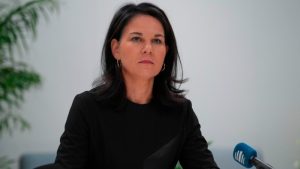COP29 and the greenwashing of Azerbaijan
Unlock the Editor’s Digest for free
Roula Khalaf, Editor of the FT, selects her favourite stories in this weekly newsletter.
Azerbaijan’s hosting of COP29 next month means the climate conference is being held for the third year running in an authoritarian state with a dubious human rights record, and for the second year in a petrostate. To ensure developing countries, and indeed fossil fuel producers, are part of a global solution to climate change, it is important they can take charge of COPs. But after Egypt and the United Arab Emirates, Azerbaijan — where the autocratic Ilham Aliyev succeeded his father as president in 2003 — also seems to hope hosting the event can greenwash its reputation.
This year’s COP takes place only 14 months after Azerbaijan chose to resolve by force a three-decade territorial dispute with neighbouring Armenia. In a lightning strike, Azerbaijani troops seized Nagorno-Karabakh, the Armenian-populated enclave inside its borders. Russian peacekeepers largely looked away. The province’s entire Armenian population of more than 100,000 was driven out. At least 23 Armenian political prisoners are still being held in Azerbaijan.
Nikol Pashinyan, Armenia’s prime minister, has made several concessions in the hope of securing a deal to normalise relations with Baku, notably recognising Azerbaijan’s territorial integrity — including Nagorno-Karabakh. Indeed, Azerbaijan was only awarded COP29 after Armenia lifted a veto in return for the release of 32 Armenian prisoners of war. But Yerevan has accused Baku of repeatedly delaying signing a largely agreed peace deal.
Worryingly, after Russia’s Vladimir Putin visited Baku in August, Moscow signalled support for Baku’s ambitions to create a land corridor linking Azerbaijan to an Azerbaijani exclave, Nakhchivan, that borders Turkey. This would run across southern Armenia and in effect block its border with Iran, a key supply route. Many in Yerevan fear Aliyev has not dropped military ambitions towards Armenia itself, which he calls “Western Azerbaijan”. Baku officials deny such intentions.
Allowing countries such as Azerbaijan to host global events can in theory shine a spotlight that forces autocrats to behave better. But Aliyev, who won a stage-managed fifth election victory in February, seems unfazed. Rights groups last week called for pressure on Baku to reverse a “vicious” further clampdown on critics, media and civil society under way ahead of the COP. Domestic rights defenders estimate the country has around 300 political prisoners. Human Rights Watch also highlighted “significant shortcomings and ambiguities” in a leaked copy of Azerbaijan’s host country agreement on protections even for the rights of COP participants.
Azerbaijan will largely rely as host on the willingness of wealthy nations to agree on COP29’s main goal of a new funding target to help developing countries cope with climate change. But some politicians and campaigners have charged that Baku’s attachment to oil and gas — which Aliyev has called its “gift from God” — has made it highly reluctant to discuss how to make further progress on a road map agreed at COP28 to “transition away” from fossil fuels. The country trumpets progress in expanding renewable energy at home, but says it is still increasing oil and gas output in large part to supply the EU, which has turned to it as an alternative provider to Russia.
Azerbaijan, which has pledged a “COP of peace”, should live up to that spirit by signing a peace deal with Armenia before it begins. International governments and attendees should use the opportunity to press the host country on its democratic record. They and the UN’s climate arm must ensure rights are respected during the conference. And reforms are badly needed to tighten the process of awarding COPs — and the obligations of the hosts.
#COP29 #greenwashing #Azerbaijan




